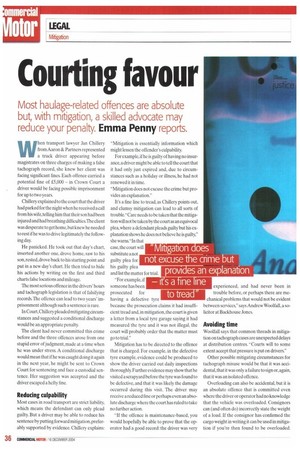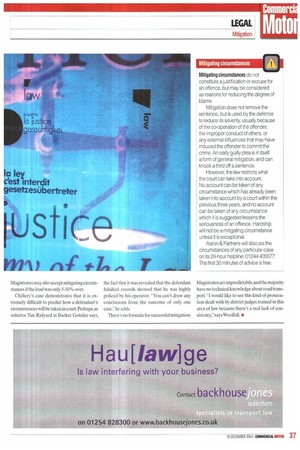Courting favour
Page 36

Page 37

If you've noticed an error in this article please click here to report it so we can fix it.
Most haulage-related offences are absolute but, with mitigation, a skilled advocate may reduce your penalty. Emma Penny reports.
When transport lawyer Jan Chillery from Aaron & Partners represented a truck driver appearing before magistrates on three charges of making a false tachograph record, she knew her client was facing significant fines. Each offence carried a potential fine of £5,000 — in Crown Court a driver would be facing possible imprisonment for up to two years.
Chillery explained to the court that the driver had parked for the night when he received a call from his wife, telling him that their son had been injured and had breathing difficulties.The client was desperate to get home, but knew he needed to rest if he was to drive legitimately the following day.
He panicked. He took out that day's chart, inserted another one, drove home, saw to his son, rested, drove back to his starting point and put in a new day's chart. He then tried to hide his actions by writing on the first and third charts false locations and mileage.
The most serious offence in the drivers' hours and tachograph legislation is that of falsifying records. The offence can lead to two years' imprisonment although such a sentence is rare.
In Court, Chillery pleaded mitigating circumstances and suggested a conditional discharge would be an appropriate penalty.
The client had never committed this crime before and the three offences arose from one stupid error of judgment, made at a time when he was under stress. A conditional discharge would mean that if he was caught doing it again in the next year, he might be sent to Crown Court for sentencing and face a custodial sentence. Her suggestion was accepted and the driver escaped a hefty fine.
Reducing culpability
Most cases in road transport are strict liability, which means the defendant can only plead guilty. But a driver may be able to reduce his sentence by putting forward mitigation,preferably supported by evidence, Chillery explains: "Mitigation is essentially information which might lessen the offender's culpability.
For example. if he is guilty of having no insurance, a driver might be able to tell the court that it had only just expired and, due to circumstances such as a holiday or illness, he had not renewed it in time.
"Mitigation does not excuse the crime but provides an explanation."
"For example, if someone has been prosecuted for having a defective tyre because the prosecution claims it had insufficient tread and, in mitigation, the court is given a letter from a local tyre garage saying it had measured the tyre and it was not illegal, the court will probably order that the matter must go to trial."
Mitigation has to be directed to the offence that is charged. For example. in the defective tyre example, evidence could be produced to show the driver carried out daily inspections thoroughly. Further evidence may show that he visited a scrapyard before the tyre was found to be defective, and that it was likely the damage occurred during this visit. The driver may receive a reduced fine or perhaps even an absolute discharge where the court has ruled to take no further action.
"If the offence is maintenance-based, you would hopefully be able to prove that the operator had a good record: the driver was very experienced, and had never been in trouble before, or perhaps there are mechanical problems that would not be evident between services," says Andrew Woolfall, a solicitor at Backhouse Jones,
Avoiding time
Woodall says that common threads in mitigation on tachograph cases are unexpected delays at distribution centres. "Courts will to some extent accept that pressure is put on drivers."
Other possible mitigating circumstances for tachograph misuse would be that it was accidental, that it was only a failure to sign or, again, that it was an isolated offence.
Overloading can also be accidental, but it is an absolute offence that is committed even where the driver or operator had no knowledge that the vehicle was overloaded. Consignors can (and often do) incorrectly state the weight of a load. lithe consignor has confirmed the cargo weight in writing it can be used in mitigation if you're then found to be overloaded. Magistrates may also accept mitigating circumstances if the load was only 5-10% over.
Chillery's case demonstrates that it is extremely difficult to predict how a defendant's circumstances will be taken in court. Perhaps. as solicitor Tim Ridyard at Barker Gotelee says, the fact that it was revealed that the defendant falsified records showed that he was highly policed by his operator. You can't draw any conclusions from the outcome of only one case," he adds There's no formula for successful mitigation. Magistrates are unpredictable, and the majority have no technical knowledge about road transport. "I would like to see this kind of prosecution dealt with by district judges trained in this area of law because there's a real lack of consistency," says Woo hal •


















































































































































































































